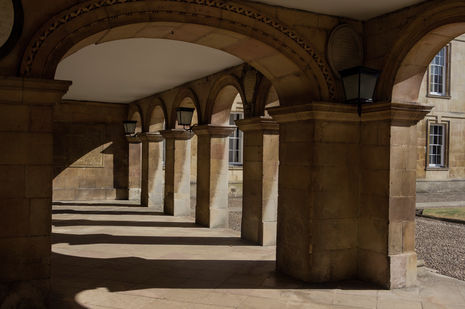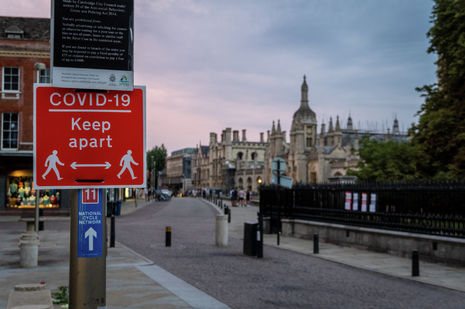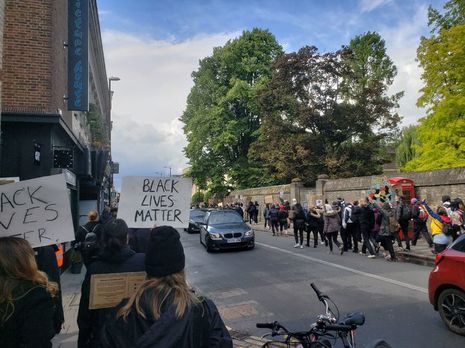A-level results uproar, Black Lives Matter and Covid-19: What went down in Cambridge this summer?
It’s been a busy, unprecedented few months for Cambridge, both for the city and the University. Senior News Editor Gaby Vides brings you up to speed on Varsity’s biggest summer stories
Algorithm errors

Cambridge responds to this year's A-level results day
Following this year’s A-level results day controversy, whereby students were awarded their grades based on an algorithm which disadvantaged state-school students from under-performing schools, Cambridge was forced to respond to calls to #HonourTheOffer. In total, over 18,000 students, staff and alumni signed a number of open letters demanding the University to relax their admissions policies.
While a number of Oxford colleges committed to giving all offer-holders their place, Cambridge did not follow suit and only admitted students who had met the conditions of their offer. However, after the government’s striking U-turn, which saw students given their centre assessed grades, Cambridge accepted students for 2020 entry who had not initially met their offer but subsequently met their offer based on their centre assessed grade.
Despite this year’s fiasco, Cambridge welcomed their largest ever undergraduate intake with a record 70% of incoming freshers’ hailing from state-school backgrounds. The University also required no student to defer their entry.
Strike while it’s hot
Extinction Rebellion campaign against the University's 'dirty' investments
Extinction Rebellion Cambridge (XRC) and Extinction Rebellion Youth Cambridge (XRYC) promised a “fresh wave of action” against the University and its non-divested colleges after the climate activist groups’ divestment deadline of the end of July was missed. XRC and XRYC issued their demands at the beginning of July, including calls for the University and colleges to fully divest from fossil fuels, the arms trade and other “ecocidal companies.” The first week of the groups’ campaign involved a theatrical protest outside of Darwin, dinosaurs marching between St Catharine’s and Sidney Sussex and activists playing croquet on Senate House Lawn. The week culminated with protestors stripping on King’s College lawns in order to “expose the naked truth” of the climate emergency.
Extinction Rebellion also marked the beginning of their ‘Summer Rebellion’ on August 28th by marching through Cambridge demanding that the University divests. At the end of the ‘oily handed divestment’ march a number of protestors were arrested for using black chalk spray to stencil their hands on the outside of Trinity College and Senate House.
Covid-19
Cambridge counters the pandemic

While the Oxford vaccine candidate has enjoyed media attention, the Cambridge vaccine candidate has developed more quietly and could potentially be ready for clinical trials by Autumn after the University received £1.9 million in funding from the government. The Cambridge vaccine candidate does not have to be stored at low temperatures nor does it have to be administered via a needle. The University also joined a coalition of 22 institutions to join the Trinity Challenge, which will work to “promote actions to ensure the world is better protected against health emergencies”. The Challenge was convened by Trinity’s current Master and applicants, who can win an initial prize fund of £10 million will be asked to focus on at least one of identification, response and recovery in health policy.
Fellowship controversy
A number of honorary positions have been renounced or removed
Fitzwilliam College and Wolfson College lost controversial Honorary Fellows this summer, with David Starkey of Fitzwilliam, and Carrie Lam, of Wolfson, both leaving their positions. Starkey, who was appointed an Honorary Fellow at Fitzwilliam College in 2006, had his honorary position removed in July following the Historian’s comment in an interview that “slavery was not genocide”. The comments were condemned “in the strongest possible terms” by the Fitzwilliam JCR while the Cambridge BME Campaign labelled Starkey a “white supremacist”. The removal of Starkey’s fellowship follows years of frustration after Fitzwilliam refused to revoke his position in 2011 when Starkey made similarly bigoted comments about the London riots.
Meanwhile, from the beginning of July Wolfson considered removing the Honorary Fellowship of Carrie Lam, Hong Kong's Chief Executive, following the enactment of a controversial National Security Law, which many regard as threatening autonomy in the city. Lam, who was given the honorary position in 2017, was contacted with concerns by Wolfson’s President Professor Jane Clarke in November 2019 yet the College decided not “to take any action” over Lam’s Fellowship. However, in a stunning role reversal, Lam renounced her Honorary position in August. Announcing the decision, she expressed her disappointment with the College’s “besmirching without factual basis and a reliance on hearsay”, regarding Wolfson’s inquiry into her fellowship.
Black Lives Matter
Cambridge reacts to the murder of George Floyd

The murder of George Flloyd, a black man in America, sparked a wave of discussions, activism and anguish about the state of racism and institutional violence facing people of colour in the United States and across the world. Cambridge was and is not immune from these injustices, with numerous open letters demanding the University and departments show a greater commitment to anti-racism. A Cambridge Black Lives Matter protest in June attracted thousands of protestors who stood in solidarity with ongoing demonstrations in the United States over police killings and systemic brutality. In response to Black Lives Matter, Cambridge University Press provided free access to books on racism and discrimination while mounting pressure forced Gonville and Cauis to remove a window pane honouring a college alumni and eugenicist, Ronald Fisher.
Dr Priyamvada Gopal, a Professor in the English Faculty, faced racist attacks in response to a tweet she posted about white privilege. Later police investigated threats made against her after racist posters were left on King’s Parade - the University condemned the abuse and reaffirmed its academics’ right to express their own opinions.
Fuelling change
4 colleges publicly divest for the first time
Newnham, Robinson, St John’s and Fitzwilliam have all publicly announced for the first time that they are partially divested from fossil fuels. This means that while the colleges hold no direct investments in fossil fuels they may still hold indirect investments - investments through an intermediary fund - in them. St John’s and Fitzwilliam both confirmed that they have been partially divested since 2013 and 2016 respectively. Similarly, Newnham on their website detailed that they “have been partially divested for several years.” Newnham, Robinson, St John’s and Fitzwilliam join a further five colleges - Selwyn, Emmanuel, Downing, Peterhouse and Jesus - who are partially divested while Queen’s and Clare Hall continue to be the only colleges who are entirely divested.
Gown helps town
College's support the local community during lockdown
King’s and St Catharine’s have both participated and arranged projects to support the local community amid the Covid-19 pandemic. Bene’t Street Hostel, King’s accommodation ordinarily used to house third-year undergraduate students, provided residence for rough sleepers from 23rd April until 31st August. The scheme to use the Hostel was arranged as part of a collaborative effort between King’s and Cambridge City Council, following the Council’s commitment to guarantee accommodation for every rough sleeper in Cambridge. Meanwhile St Catharine’s, in partnership with Cambridge Women’s Aid, provided a total of 1456 nights of accommodation for women and children escaping domestic violence. The College housed 23 women and children between April 27th and September 3rd.
 Features / Should I stay or should I go? Cambridge students and alumni reflect on how their memories stay with them15 December 2025
Features / Should I stay or should I go? Cambridge students and alumni reflect on how their memories stay with them15 December 2025 News / Cambridge study finds students learn better with notes than AI13 December 2025
News / Cambridge study finds students learn better with notes than AI13 December 2025 News / Uni Scout and Guide Club affirms trans inclusion 12 December 2025
News / Uni Scout and Guide Club affirms trans inclusion 12 December 2025 Comment / The magic of an eight-week term15 December 2025
Comment / The magic of an eight-week term15 December 2025 News / News In Brief: Michaelmas marriages, monogamous mammals, and messaging manipulation15 December 2025
News / News In Brief: Michaelmas marriages, monogamous mammals, and messaging manipulation15 December 2025







